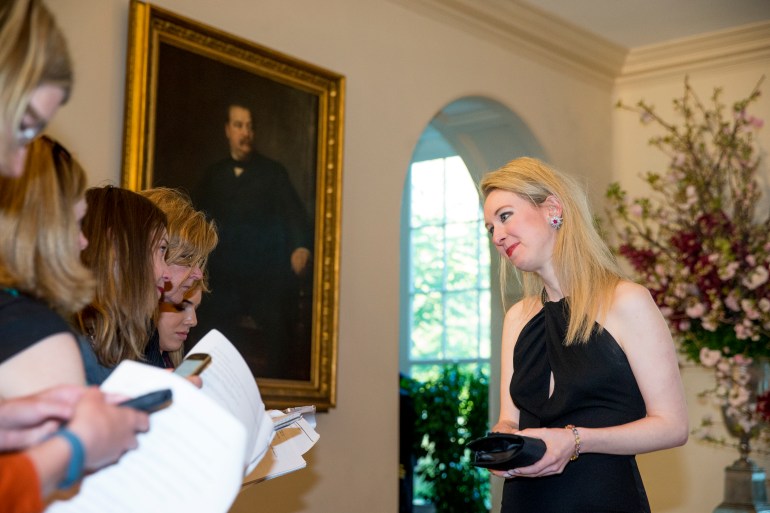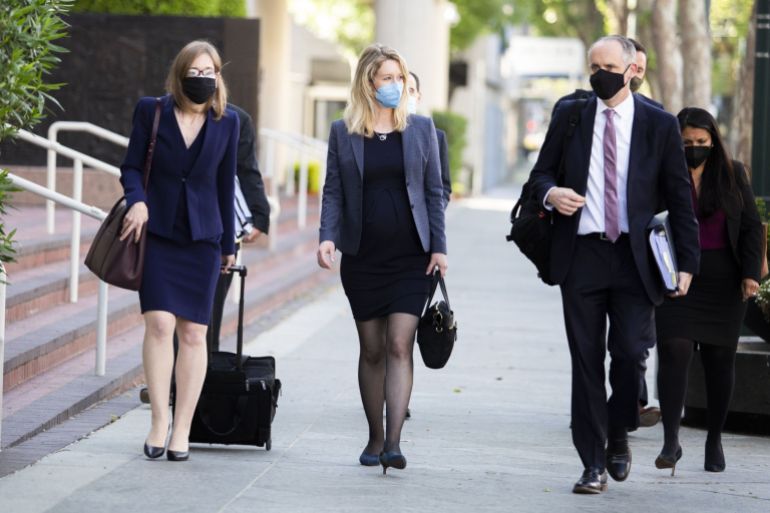United States prosecutors are out for blood — or, more accurately, 20 years of jail time and a nearly $3m fine — for Elizabeth Holmes, the disgraced former CEO of Theranos, a once-glitzy $9bn tech startup that claimed it was changing the world of healthcare one drop of blood at a time.
In her heyday, the turtleneck-wearing, raspy-voiced Holmes was hailed as a disruptive genius and investor darling who claimed Theranos had created proprietary technology — a machine called the Edison — that used a tiny drop of blood to screen for a variety of medical conditions, touting it as the future of lab testing technology.
Theranos claimed Edison could perform life-saving tests cheaply just about anywhere using only a finger prick of blood rather than a full vial from a vein.
The machine would save money for patients and doctors, and potentially provide early diagnosis for over 200 conditions at locations as convenient as grocery stores and pharmacies.
That is, if it actually worked. In 2015, the Wall Street Journal broke the story based on whistle-blower reports and deep dives into the data that showed that the proprietary technology owned by Theranos operated inconsistently, if at all, and that tests were running on traditional lab equipment behind closed doors.
In 2018, the company shuttered. Holmes and former Theranos president and chief operating officer, Ramesh “Sunny” Balwani, are now both facing criminal charges.
Jury selection in Holmes’s trial is slated to begin on Tuesday, years after the scandal broke. Here’s what you need to know.
 Elizabeth Holmes (right) faces two counts of conspiracy to commit wire fraud and nine counts of wire fraud [File: Nina Riggio/Bloomberg]
Elizabeth Holmes (right) faces two counts of conspiracy to commit wire fraud and nine counts of wire fraud [File: Nina Riggio/Bloomberg]Wait, wasn’t she once called the female Steve Jobs?
Yes. Holmes was known for her fascination with the founder of Apple and mimicked him in many ways, including wearing the same signature turtleneck and referring to her Edison machine as “the iPod of healthcare”.
Theranos also used slick marketing materials designed by the same company Apple used for its iconic ads.
Holmes was also influenced by other Silicon Valley icons. According to reporting by John Carreyrou in The Wall Street Journal, one of Holmes’s early mentors was Oracle co-founder Larry Ellison, who allegedly told Holmes to push her team, even when the team told her that expectations were unfeasible.
Investors were also drawn to Holmes’s prodigy backstory: she dropped out of Stanford University at 19. Many also wanted to get in on the ground floor of what they thought could be a billion-dollar company with a woman at the helm working to help people.
 Before her fall from grace, Elizabeth Holmes, then identified as a billionaire, was invited to speak at prominent gatherings like the 2015 Fortune Global Forum, which brings together Global 500 CEOs and innovators, builders and technologists from some of biggest emerging companies [File: David Paul Morris/Bloomberg]
Before her fall from grace, Elizabeth Holmes, then identified as a billionaire, was invited to speak at prominent gatherings like the 2015 Fortune Global Forum, which brings together Global 500 CEOs and innovators, builders and technologists from some of biggest emerging companies [File: David Paul Morris/Bloomberg]So what is Holmes accused of?
Holmes and Balwani are being charged with two counts of conspiracy to commit wire fraud and nine counts of wire fraud for allegedly engaging “in a multi-million-dollar scheme to defraud investors, and a separate scheme to defraud doctors and patients”, according to the indictment.
The two are being tried separately, with Balwani’s day in court set for January 2022.
Holmes’s trial was previously delayed due to her pregnancy. She gave birth to a baby boy in July.
What did the alleged fraud entail?
Holmes and Balwani are accused of using “a combination of direct communications, marketing materials, statements to the media, financial statements, models, and other information to defraud potential investors”.
And they were some pretty heavy-hitting investors. Theranos boasted a dazzling array of A-list supporters, including Oracle co-founder Ellison, Walmart founders the Walton family, media mogul Rupert Murdoch, and former US Secretary of Education Betsy DeVos. Theranos’s board members included former US Secretary of State Henry Kissinger.
At the time, many bright people thought Holmes’s machine would change the world. But that wasn’t the case.
 Holmes (right) even attended a state dinner for Japan’s former Prime Minister Shinzo Abe at the White House in 2015, three years before she was formally charged with fraud [File: Andrew Harnik/AP Photo]
Holmes (right) even attended a state dinner for Japan’s former Prime Minister Shinzo Abe at the White House in 2015, three years before she was formally charged with fraud [File: Andrew Harnik/AP Photo]How did the world find out the machine didn’t work?
As Theranos attracted media attention during its meteoric rise, so too, did it attract media scrutiny.
Carreyrou broke the story for The Wall Street Journal with the help of certain whistle-blowers within Theranos, including Tyler Shultz.
Shultz, the grandson of former US Secretary of State George Shultz, a board member of the company, had a job as a research engineer. He began speaking to Carreyou confidentially when he noticed “quality control failures” with the Edison machine.
Initial attempts to correct issues internally went unheeded, which caused Shultz to quit Theranos and go on the record about the troubling things he had seen at work.
Was anyone harmed by the machine?
In 2018, nine people who had used Theranos blood-testing technology came forward as part of a class-action lawsuit against the company and against drugstore Walgreens, which had offered testing in partnership with Theranos.
One patient claimed that she tested positive on the Theranos equipment for an autoimmune disease, prompting a range of tests by her doctor, who eventually determined she did not have the disease.
Another woman who used Theranos equipment said the testing determined she was positive for Hashimoto’s disease, a thyroid condition that caused her to change her lifestyle, take medication and make medical appointments while seeking out additional treatment she did not need.
 Elizabeth Holmes (centre) and her legal team have not commented much about her defence to the public [File: Nina Riggio/Bloomberg]
Elizabeth Holmes (centre) and her legal team have not commented much about her defence to the public [File: Nina Riggio/Bloomberg]What kind of defence is Holmes expected to mount?
That remains to be seen, as her legal team hasn’t commented about it in the press.
One common defence strategy employed during wire fraud cases can be what’s known as “a good faith defence” — that company founders didn’t knowingly mean to mislead investors. But that may be hard to mount given the depth and breadth of information uncovered by Carreyrou and others about the company.
There has also been speculation about whether Holmes’s mental health may be brought up.
How long is the trial expected to last?
Jury selection begins on August 31.
Already, however, eliminating potential jurors who say they have read, watched or listened to the numerous books, series and podcasts about Theranos has become a subject of debate between Holmes’s attorney, Kevin Downey, and US District Judge Edward Davila.
Has Silicon Valley changed in the wake of the Theranos scandal?
Yes — just ask female entrepreneurs, who say they are consistently questioned about Holmes and face outsize investor scrutiny.
But the long-term upside for investors, as well as start-up founders, could be more regulation and checks and balances in the formerly Wild West-esque world of Silicon Valley.
With so much at stake, new start-ups may choose to create workplaces that are more open to listening to employee concerns, as well as fostering more transparent communication with their investors and board members.
What is Theranos founder Elizabeth Holmes on trial for? - Al Jazeera English
Read More

Tidak ada komentar:
Posting Komentar